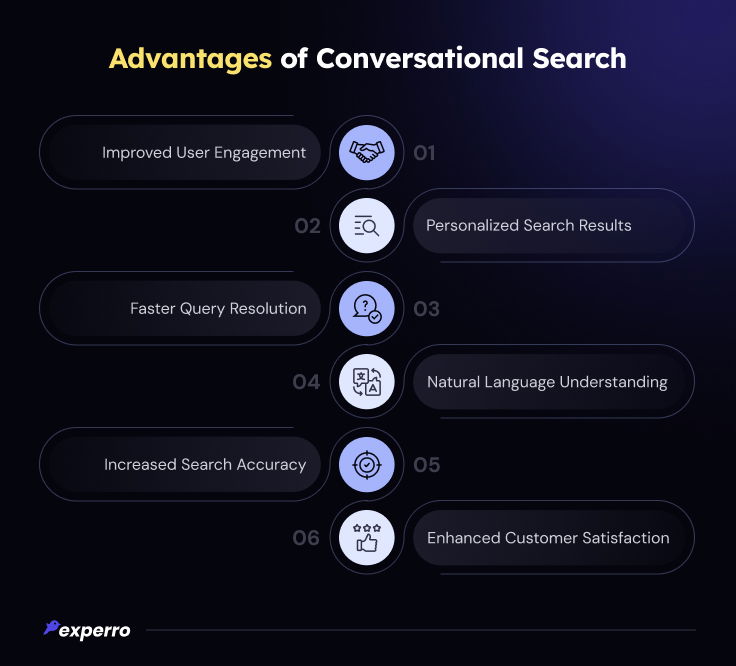What is Conversational Search & How Does it Work?

What’s Inside
- What Is a Conversational Search Engine?
- How Does Conversational Search Function?
- What Are the Advantages of Conversational Search?
- Innovative Use Cases of AI-Powered Conversational Search
- What Is the Future of Conversational Search?
- Conclusion
Key takeaways
- Conversational search transforms search experience by enabling users to ask common questions in natural language.
- It utilizes artificial intelligence and NLP to understand context and deliver more relevant, personalized results.
- This technology enhances search efficiency, leading to quicker and more accurate query resolution.
- Experro provides real-time commerce interaction to create a seamless and engaging eCommerce experience.
Ever asked your search engine, "Where's the best pizza around?" and it replies, 'Craving pepperoni?'
That's conversational search—AI that gets you!
Unlike traditional search engines that rely on specific keywords, conversational search uses natural language to provide a more interactive and human-like search experience.
With chat-based commerce, users can ask follow-up questions in a conversational tone, like how they would speak to another person.
Leading search engines like Google and Bing have implemented dialogue-driven results. eCommerce platforms are now adopting these features to improve user experiences.
As the demand for more personalized and accurate search results increases, conversational search platforms are essential for enhancing user experience.
What Is a Conversational Search Engine?

A conversational search engine is a search platform to understand and respond to natural language search queries.
These engines analyze the context of a question, providing more personalized conversational search results.
With advancements in conversational search software, these engines continue to improve customer experience by offering real-time, accurate responses.
How Does Conversational Search Function?
Real-time commerce interaction functions by leveraging natural language processing (NLP) and machine learning to interpret user queries. The product search engine listens or reads a question, analyzes its context, and delivers a relevant answer.
Global conversational AI market is expected to reach USD 86.42 billion by 2032, growing at a CAGR of 23.97% from 2024 to 2032.
The growing demand for AI that understands context and intent is a key factor driving the rapid growth of the conversational AI market.
Unlike traditional keyword search systems, conversational search AI doesn't just match keywords.
It goes beyond. It understands the user's intent. Features of conversational search, such as voice recognition and semantic understanding help improve accuracy.
Conversational search functionality is often integrated into platforms like voice assistants, eCommerce sites, and apps, offering the best possible experience across devices.
This system learns from previous search queries, ensuring continuous improvement in the quality of results.
What Are the Advantages of Conversational Search?
The benefits of conversational search go beyond interactions. It reshapes how users interact with multimodal search engine and digital platforms, creating more meaningful, personalized experiences.

Below are some of the key advantages that conversational search systems provide.
1. Improved User Engagement
Dialogue-driven commerce enhances user engagement by offering a more interactive and dynamic search experience. Users no longer must input rigid keywords to find what they need.
Instead, conversational search UI enables users to ask questions naturally. The system can lead the conversation by suggesting useful questions.
As a result, an online business using conversational search software can retain users for extended periods, improving overall human interaction on their platforms.
2. Personalized Search Results
AI-powered chat-based commerce delivers personalized search results tailored to individual preferences. By understanding the context and search history of a user’s conversational queries, these systems provide more relevant and customized answers.
This is especially useful in eCommerce conversational search, where customers can receive product suggestions based on previous interactions.
With eCommerce search optimization, platforms can ensure users receive results that align closely with their needs, improving satisfaction.
3. Faster Query Resolution
One of the best benefits of conversational search technology is its ability to resolve queries faster. Instead of navigating through multiple result pages, users receive direct answers to their questions.
This makes the search process more efficient, reducing the time spent searching. The conversational search experience is particularly beneficial for online businesses, as it leads to quicker customer support and query resolution.
Conversational search tools make it easier to find information or products with minimal effort, speeding up decision-making.
4. Natural Language Understanding
Conversational algorithms excel in understanding natural language search, which allows users to communicate more freely. The system not only grasps the short and long-tail keywords but also the context and intent behind the question.
For example, Google conversational search is built to understand casual speech and slang, making it easier for more people to use. This natural language understanding enhances the user experience by eliminating the need for precise phrasing.
Whether in spoken or typed queries, voice search systems are designed to keep the interaction smooth and intuitive.
5. Increased Search Accuracy
With AI conversational search, the accuracy of search results improves drastically. The system uses AI to learn from previous queries and adapt to user behavior, which helps to deliver more precise results.
Search intelligence on eCommerce platforms continuously refine their algorithms to provide the most relevant answers.
This level of accuracy is especially valuable for complex queries where users may not know the exact terms to search. Conversational keyword research ensures the engine delivers results matching the user’s true intent.
6. Enhanced Customer Satisfaction
Conversational search engines help improve customer satisfaction by offering quick, relevant, and personalized results.
In sectors like eCommerce, conversational search shopping allows customers to find what they’re looking for without hassle, leading to higher conversion rates.
As businesses integrate conversational API and dashboards, they can track user satisfaction in real-time, making necessary adjustments to optimize the user experience.
By offering faster query resolution and more accurate responses, businesses can improve customer loyalty and overall satisfaction.
Innovative Use Cases of AI-Powered Conversational Search
Conversational search technology has a wide range of gen AI use cases across different industries.
From retail to complex customer support systems, this AI-driven approach reshapes how businesses interact with customers.

Let’s look at some innovative applications of chat-based commerce in detail.
1. Visual Search
Visual search integrates conversational search capabilities with image recognition, allowing users to search using pictures instead of text.
This feature is particularly valuable in eCommerce, where customers can search for products by uploading images. Conversational AI search platforms then engage users in a dialogue to refine the results further.
It helps customers find exactly what they’re looking for, improving the overall shopping experience.
2. Semantic Search
Semantic search uses dialogue-driven commerce to understand the meaning behind a query rather than just matching keywords.
This leads to more relevant search results. Conversational search systems using semantic understanding provide more contextually appropriate answers.
Semantic search plays a crucial role especially in industries like healthcare or legal services, where accuracy is critical. Conversational search functionality improves the depth of the search results, ensuring a richer, more insightful user experience.
3. Interactive Commerce
Conversational commerce is reshaping the way people shop online. With chat-based commerce in eCommerce, customers can ask detailed questions about products, receive personalized recommendations, and even complete transactions via chat.
Businesses using conversational search optimization in their platforms can improve their sales funnel by delivering a seamless, interactive shopping experience.
This conversational approach to shopping enables faster decision-making and a smoother customer journey.
4. Multilingual Search Capabilities
Advanced AI-powered dialogue-driven commerce supports multilingual capabilities, enabling users to search in their native languages. This feature is especially useful for global companies that serve diverse markets.
For example, conversational search on Bing is built to understand casual speech and slang, making it easier for more people to use.
This multilingual conversational search capability enhances the search experience for non-English speaking users, making it more inclusive and efficient.
5. Answering Complex Customer Queries
Chat-based commerce is ideal for handling complex customer queries that require detailed responses. Conversational AI systems are equipped to dive deeper into customer problems, offering step-by-step solutions in real-time.
Whether it’s troubleshooting a technical issue or answering specific product questions, these systems provide quick and precise answers.
With conversational dashboards, businesses can monitor these interactions and continuously improve customer support.
What Is the Future of Conversational Search?
The future of conversational search looks promising, with advancements in generative AI for eCommerce, including NLP and ML driving its evolution.
Conversational search technology is expected to become more integrated across platforms, providing users with a seamless, multi-channel experience.
As AI-powered search systems become more refined, they will handle increasingly complex queries with greater accuracy. We can also expect more personalized interactions, as conversational search AI learns from individual behaviors.
Conclusion
Conversational search is not just a trend but a fundamental shift in how we interact with search engines and digital platforms.
As AI-powered systems continue to evolve, dialogue-driven commerce will become essential for businesses and users alike.
The ability to understand natural language, provide personalized results, and resolve queries quickly makes real-time commerce interaction a powerful feature for enhancing user satisfaction.
Whether it’s improving eCommerce platforms or handling complex queries in customer service, the benefits of conversational search are undeniable.
As technology advances, the future holds even more potential for creating a more engaging, accurate, and human-like search experience.
FAQs



Pallavi Dadhich
27 September 2024Pallavi is an ambitious author known for her expertise in crafting compelling content across various domains. Beyond her professional pursuits, Pallavi is deeply passionate about continuous learning, often immersing herself in the latest industry trends. When not weaving words, she dedicates her time to mastering graphic design.